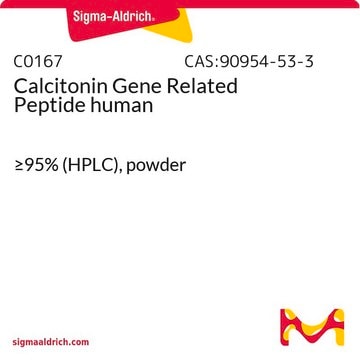C0292
Calcitonin Gene Related Peptide rat
≥95% (HPLC), powder
Synonym(s):
α-CGRP, CGRP-I
About This Item
Recommended Products
biological source
rat
Quality Level
Assay
≥95% (HPLC)
form
powder
mol wt
3803.25-3809.25 Da
technique(s)
cell based assay: suitable
sequence note
Ser-Cys-Asn-Thr-Ala-Thr-Cys-Val-Thr-His-Arg-Leu-Ala-Gly-Leu-Leu-Ser-Arg-Ser-Gly-Gly-Val-Val-Lys-Asp-Asn-Phe-Val-Pro-Thr-Asn-Val-Gly-Ser-Glu-Ala-Phe-NH2
storage temp.
−20°C
Gene Information
rat ... Calca(24241)
Looking for similar products? Visit Product Comparison Guide
Amino Acid Sequence
General description
Calcitonin gene related peptide (CGRP) is a 37 amino acid neuropeptide. It exists in two isoforms α-CGRP and β-CGRP. CGRP is produced by the alternative splicing of the calcitonin gene (CALCA). They are primarily localized in the C and Aδ sensory fibers, but are also present in non-neuronal tissues, like the cardiovascular system.
Application
- To study its protective role in lipopolysaccharide (LPS)-induced acute lung injury (ALI).
- To examine the effects of calcitonin gene related peptide (CGRP) and salmon calcitonin (sCT) on gastric lesions and mucosal barrier in stress induced rats.
- To mediate the complement component 5a (C5a) induced mechanical hypersensitivity by activating nerve fibers and influencing non-neuronal cell movement through its receptor.
Biochem/physiol Actions
Other Notes
Storage Class Code
13 - Non Combustible Solids
WGK
WGK 3
Flash Point(F)
Not applicable
Flash Point(C)
Not applicable
Personal Protective Equipment
Certificates of Analysis (COA)
Search for Certificates of Analysis (COA) by entering the products Lot/Batch Number. Lot and Batch Numbers can be found on a product’s label following the words ‘Lot’ or ‘Batch’.
Already Own This Product?
Find documentation for the products that you have recently purchased in the Document Library.
Customers Also Viewed
Our team of scientists has experience in all areas of research including Life Science, Material Science, Chemical Synthesis, Chromatography, Analytical and many others.
Contact Technical Service









